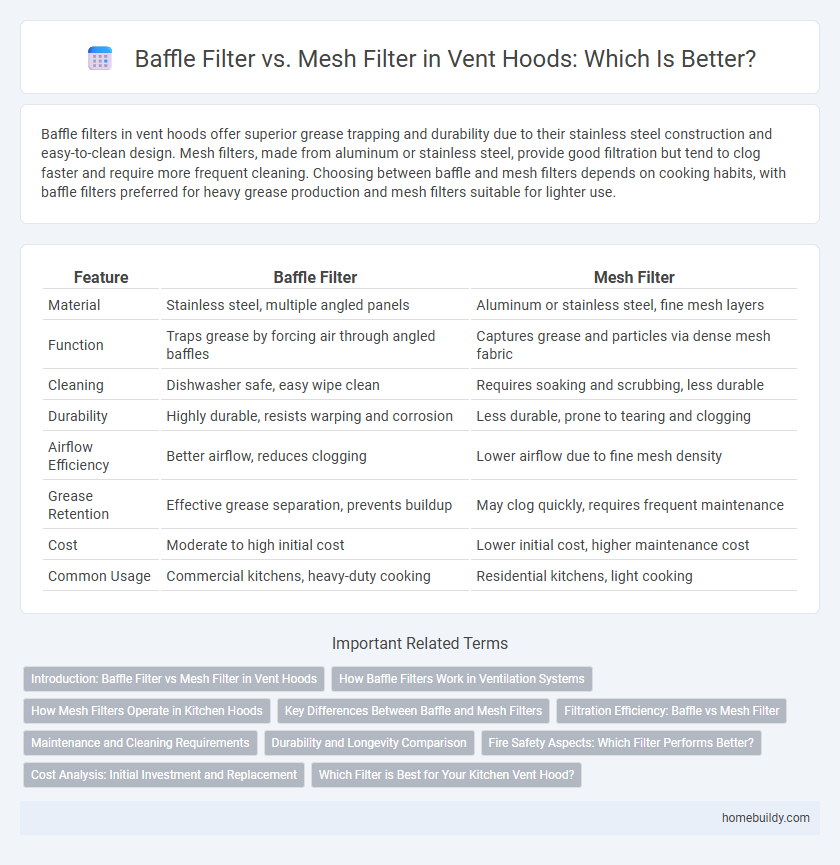Baffle filters in vent hoods offer superior grease trapping and durability due to their stainless steel construction and easy-to-clean design. Mesh filters, made from aluminum or stainless steel, provide good filtration but tend to clog faster and require more frequent cleaning. Choosing between baffle and mesh filters depends on cooking habits, with baffle filters preferred for heavy grease production and mesh filters suitable for lighter use.
Table of Comparison
| Feature | Baffle Filter | Mesh Filter |
|---|---|---|
| Material | Stainless steel, multiple angled panels | Aluminum or stainless steel, fine mesh layers |
| Function | Traps grease by forcing air through angled baffles | Captures grease and particles via dense mesh fabric |
| Cleaning | Dishwasher safe, easy wipe clean | Requires soaking and scrubbing, less durable |
| Durability | Highly durable, resists warping and corrosion | Less durable, prone to tearing and clogging |
| Airflow Efficiency | Better airflow, reduces clogging | Lower airflow due to fine mesh density |
| Grease Retention | Effective grease separation, prevents buildup | May clog quickly, requires frequent maintenance |
| Cost | Moderate to high initial cost | Lower initial cost, higher maintenance cost |
| Common Usage | Commercial kitchens, heavy-duty cooking | Residential kitchens, light cooking |
Introduction: Baffle Filter vs Mesh Filter in Vent Hoods
Baffle filters and mesh filters serve distinct roles in vent hoods, with baffle filters designed for better grease separation through angled metal slats, reducing clogging and improving airflow efficiency. Mesh filters consist of multiple layers of fine metal mesh that trap grease and particulate matter but require more frequent cleaning due to higher clogging risk. Vent hoods equipped with baffle filters are often preferred in commercial kitchens for durability and maintenance ease, while mesh filters are common in residential settings for their cost-effectiveness.
How Baffle Filters Work in Ventilation Systems
Baffle filters in vent hoods operate by forcing air to change direction sharply, causing grease and particles to separate from the airflow and collect on the filter surfaces. Their curved, metal design promotes efficient grease capture and prevents clogging, maintaining optimal ventilation performance. Compared to mesh filters, baffle filters offer superior durability and easier maintenance in commercial kitchen ventilation systems.
How Mesh Filters Operate in Kitchen Hoods
Mesh filters in vent hoods function by trapping grease particles through multiple layers of interwoven metal strands, allowing air to pass while capturing contaminants. Their fine mesh design effectively filters out small grease droplets, preventing buildup in the ductwork and improving indoor air quality. Regular cleaning maintains optimal airflow and ensures the vent hood's efficient operation.
Key Differences Between Baffle and Mesh Filters
Baffle filters, made of stainless steel, feature a series of angled plates that force grease and smoke to change direction, effectively trapping contaminants and allowing better airflow compared to mesh filters. Mesh filters, typically constructed from multiple layers of aluminum or stainless steel mesh, capture grease particles through a dense network but tend to clog more quickly, requiring frequent cleaning. Baffle filters offer superior durability, easier maintenance, and higher grease separation efficiency, making them ideal for commercial and heavy-duty kitchen ventilation systems.
Filtration Efficiency: Baffle vs Mesh Filter
Baffle filters offer superior filtration efficiency by effectively diverting grease and particulates through angled metal plates, reducing clogging and maintaining airflow. Mesh filters capture grease particles via a fine metal mesh but require frequent cleaning to prevent buildup and reduced performance. The durable construction of baffle filters ensures longer-lasting grease separation and consistent ventilation compared to mesh filters.
Maintenance and Cleaning Requirements
Baffle filters require less frequent cleaning as they efficiently trap grease through their angled metal slats, allowing grease to drain downward, reducing buildup compared to mesh filters. Mesh filters capture smaller particles but demand more frequent maintenance since grease easily clogs their fine mesh, necessitating regular washing to maintain airflow and performance. Choosing baffle filters minimizes grease accumulation and simplifies cleaning routines in commercial and residential vent hoods.
Durability and Longevity Comparison
Baffle filters in vent hoods offer superior durability and longer lifespan compared to mesh filters due to their stainless steel construction, which resists warping and corrosion. Mesh filters, typically made from aluminum or stainless steel mesh, are prone to clogging and damage from frequent cleaning, reducing their longevity. The robustness of baffle filters ensures consistent performance over time, making them a preferred choice for kitchens with heavy cooking activity.
Fire Safety Aspects: Which Filter Performs Better?
Baffle filters outperform mesh filters in fire safety due to their curved, stainless steel design that effectively traps grease while allowing airflow, reducing fire hazards in vent hoods. Mesh filters consist of fine aluminum or stainless steel layers that easily accumulate grease, increasing the risk of ignition during high heat exposure. The baffle filter's self-cleaning mechanism under airflow prevents grease buildup, making it the safer choice for reducing fire hazards in kitchen ventilation systems.
Cost Analysis: Initial Investment and Replacement
Baffle filters in vent hoods typically have a higher initial investment compared to mesh filters due to their durable stainless steel construction and superior grease-trapping efficiency. Replacement costs for baffle filters are lower over time because they require less frequent changes and are easier to clean, whereas mesh filters, often made from aluminum or synthetic materials, demand more frequent replacement, increasing long-term expenses. Evaluating cost analysis between baffle and mesh filters involves balancing upfront expenditure against ongoing maintenance and replacement frequency.
Which Filter is Best for Your Kitchen Vent Hood?
Baffle filters offer superior grease capture and durability, making them ideal for high-heat, heavy-cooking environments in kitchen vent hoods. Mesh filters provide a finer filtration for trapping smaller particles but require more frequent cleaning and can degrade faster over time. Choosing the best filter depends on your cooking style, grease output, and maintenance preferences, with baffle filters often preferred for commercial and frequent home cooking.
Baffle filter vs Mesh filter (vent hood) Infographic

 homebuildy.com
homebuildy.com